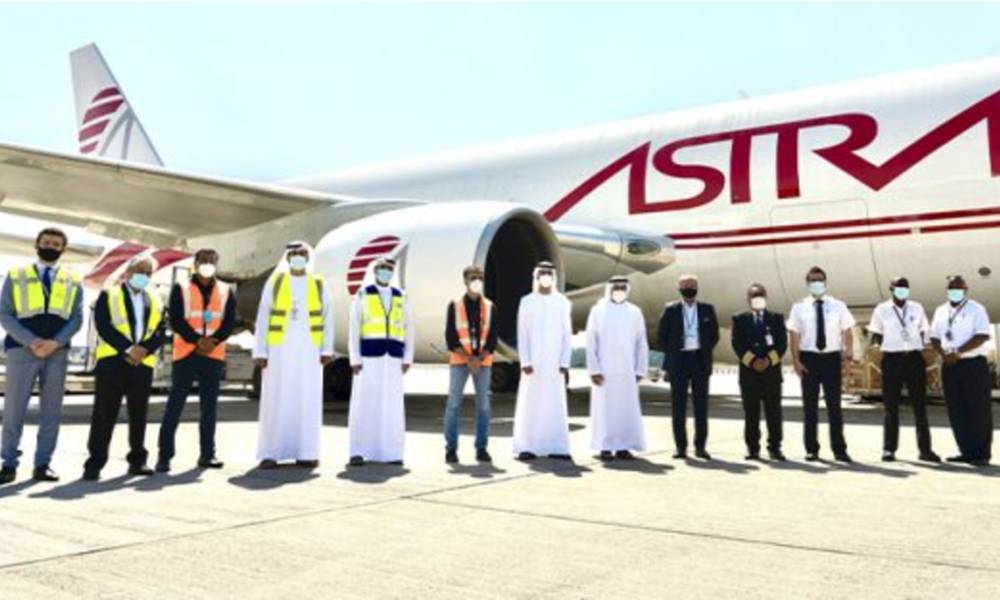
Sharjah Airport becomes Astral Aviation's hub in the Middle East
Sharjah Airport was chosen due to its strategic location, as well as the services it provides in accordance with the highest international standards, such as handling shipments which require specific temperatures and include food products, in addition to the storage and handling of medicinal and health products.

Sharjah Airport Authority has announced that Astral Aviation, a cargo airline based in Nairobi, Kenya, has joined Sharjah Airport to become the first cargo centre, as part of the expansion of the company's operations in the Middle East. Two flights per week will be launched from Nairobi, Kenya to Sharjah, using the Boeing 767 aircraft, starting from January 2021.
Sharjah Airport was chosen due to its strategic location, as well as the services it provides in accordance with the highest international standards, such as handling shipments which require specific temperatures and include food products, in addition to the storage and handling of medicinal and health products.
The reception was held for the crew and company headquarters upon the plane landing on the runway of Sharjah Airport and after crossing the traditional water cannon salute, in the presence of Ali Salim Al Midfa, chairman of Sharjah Airport Authority, Sheikh Faisal bin Saoud Al Qassimi, director of the Authority and Sanjeev Gadhia, founder and CEO of Astral Aviation, in addition to a number of employees from both sides.
Infrastructure and logistics communication
Ali Salim Al Midfa, chairman of Sharjah Airport Authority, said, "Sharjah Airport continues to attract new airlines and routes, such as Astral Aviation, which cements our leading position as an international hub for freight. Agreements such as this also confirm our commitment to providing the highest international standards and practices for the air cargo sector through specialised warehousing, which has obtained CEIV accreditation from the International Air Transport Association (IATA). We look forward to employing our full logistical capabilities and working with Astral Aviation to ship Covid-19 vaccines from China to the African continent in an efficient and smooth manner."
He added, "The advanced infrastructure provided by the airport, and the support air freight systems that connect the cargo center to all international destinations, constitute a qualitative addition, especially since Sharjah Airport has proven its efficiency and ability to quickly respond to cargo operations that need special attention in terms of handling, shipping and storage."
Sharjah Airport is Astral's first Middle Eastern hub
Sanjeev Gadhia, founder and CEO of Astral Aviation said: "We are truly honored to enter into an agreement with Sharjah Airport which will become Astral's Middle Eastern Hub, and its third global hub after Nairobi, Kenya and Liege, Belgium".
He added, "We will provide a scheduled service for perishables from East Africa to Sharjah for the UAE region, while on the return, Astral's consolidations from China, and UAE will be moved from Sharjah to Nairobi for onward connection to Astral's intra-African network. The introduction of the new freighter service between Kenya and UAE will result in an increase in trade and new opportunities between the private sector with direct connectivity which will benefit both countries".
A series of procedures and systems to ensure quality
The storage and handling unit of medicinal products at the cargo centre at Sharjah Airport requires continuous temperature control and monitoring thermal changes from the moment they disembark the plane to the moment of delivery. Importing companies work within a series of procedures and regulations to ensure the quality of medicinal products for human health and safety.
It is noteworthy that Astral Aviation is a cargo airline headquartered in Nairobi – Kenya, with a second hub in Liege – Belgium, while the Sharjah Airport will be the third hub for the company and the first in the Middle East. It began operations in January 2001 and is the largest private cargo company in Africa, with a total of 14 cargo planes, with plans to increase to 20 aircraft by the end of 2021. The company operates scheduled and unscheduled cargo services to various regional destinations in Africa and international flights to various European destinations.

